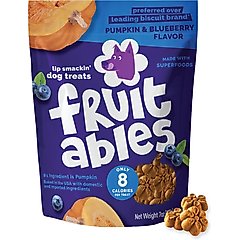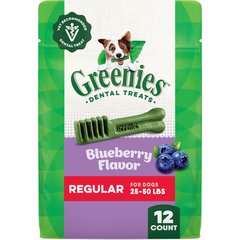Can Dogs Eat Blueberries?

Photo by Chewy
Can dogs eat blueberries? Yes! Blueberries are not only safe for dogs to eat, but they’re also a low-calorie treat that’s packed with vitamins and minerals. They’re high in fiber too. And while fresh is best, unsweetened frozen blueberries for dogs are also on the menu.
We spoke with Deborah Bayazit, DVM, co-owner and medical director of Brilliant Veterinary Care in New York City, for tips and advice on how to include blueberries in your pup’s diet.
Before introducing any new food into your dog’s diet, always check with your veterinarian.
Key Takeaways
- Dogs can safely eat fresh or unsweetened frozen blueberries in moderation.
- Blueberries are rich in antioxidants, vitamins C and K, and fiber, making them a nutritious treat.
- Avoid giving dogs blueberry-flavored baked goods or those containing sugar or xylitol.
- Too many blueberries can cause digestive upset; always serve portions appropriate for your dog’s size.
Can Dogs Eat Blueberries?
Yes, dogs can eat blueberries—both fresh and frozen. They should be plain and unsweetened.
Never feed your pup blueberries that are canned, sugared, or packed in syrup. The sugar content is too high, and these foods might have added preservatives and sweeteners like xylitol, which can be deadly. Also avoid baked goods and sweets made with blueberries, like blueberry muffins or blueberry pie.
You can also treat dogs to blueberry-flavored dog treats. Here are some of our favorites:
Recommended Products
Are Blueberries Good for Dogs?
If served in moderation, yes, blueberries are a healthful treat that’s safe for dogs. Some of the benefits of adding this superfood to your dog’s diet include:
- High antioxidant capacity, including flavonoids
- High in vitamins C and K to support your pup’s immune system
- High in fiber, nutrient-dense, and low in calories
- 85% water for additional hydration benefits
Are Blueberries Bad for Dogs?
Downsides of feeding blueberries to dogs include:
- They can be a choking hazard. Because they’re small and round, whole blueberries can be a choking hazard, especially for small dogs. Try cutting them in half or mashing them before serving.
- They can cause upset stomach. Blueberries contain natural sugars. Eating too many can cause an upset stomach, diarrhea, or vomiting.
- They may contain harmful chemicals. Conventionally grown blueberries can have pesticide or chemical residues that may irritate your dog’s stomach or cause gastrointestinal upset. Choose organic blueberries when possible, and always wash fruit thoroughly before serving.
How Many Blueberries Can My Dog Eat?
Treats, including blueberries, should make up no more than 10% of your dog’s daily caloric intake, with the rest coming from a complete and balanced dog food.
Because they contain sugar, blueberries need to be served in moderation. Too many blueberries can potentially cause stomach upset, so start with a few berries and see how your pup takes to them.
That said, below are general guidelines. Always consult with your vet before serving blueberries, to determine the right portion size for your dog. Even a healthy treat like blueberries should be factored into your dog’s optimum daily balanced diet.
| Dog Size | Serving Size | Frequency |
|---|---|---|
| Extra-small dogs (2–10 pounds) | 1–2 blueberries | Daily |
| Small dogs (11–20 pounds) | 2–3 blueberries | Daily |
| Medium dogs (21–50 pounds) | 3–5 blueberries | Daily |
| Large dogs (51–90 pounds) | 5–6 blueberries | Daily |
| Extra-large dogs (91+ pounds) | 6–10 blueberries | Daily |
How To Safely Feed Blueberries to Dogs
Dr. Bayazit says buying and serving organic blueberries is always preferable; either way, careful and thorough washing of the fruits is vital prior to serving.
Fresh or unsweetened frozen blueberries can be:
- A daily treat for your pup
- Sprinkled into your prepared dog food
- Fed one-by-one as a special treat
- Used as an excellent training treat for dogs who love them
- Stuffed into a treat toy, like the KONG Classic Dog Toy
Recommended Product
- Blended with plain, sugar-free, xylitol-free yogurt and spread onto a lick mat, like the Pink Papyrus Lick Mat
Recommended Product
- Served up as an extra special cooling treat on hot summer days
- Included as an ingredient in a refreshing homemade dog treat, like this Summertime Pawpsicle Dog Treat or this Farmers’ Market Green Smoothie Bowl
My Dog Ate Too Many Blueberries—What Do I Do?
If you suspect your pet is sick, please call your vet immediately.
Because blueberries contain sugar, they can give your dog an upset stomach when eaten in excess. Some signs that your dog has eaten too many blueberries are:
- Diarrhea
- Vomiting
- Decreased appetite
- Discomfort
- Excessively licking their lips
FAQs About Dogs and Blueberries
Can dogs eat blueberry muffins?
No, dogs shouldn’t eat blueberry muffins. Like most other baked goods, blueberry muffins add unnecessary sugar to your pup’s diet, and sugar-free muffins may be sweetened with xylitol, which is toxic to dogs.
Are dogs allergic to blueberries?
According to Dr. Bayazit, very few dogs have a true allergy to blueberries. Your dog may react to organic or synthetic chemicals applied when berries are being grown, so buy organic and always wash carefully before serving.
Can dogs eat blueberries every day?
Whether a dog can eat blueberries every day depends on your dog’s tolerance for the juicy fruit. As with any other fruit, too much of it can cause soft stool or diarrhea, notes Dr. Bayazit. If your dog has vomiting or diarrhea after eating any food, including blueberries, stop giving that food to your pup.








